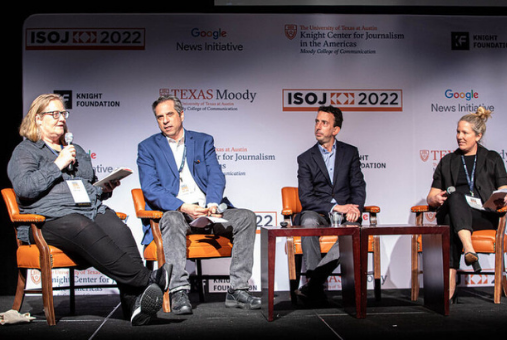The panel “Subsidies and regulation: How government initiatives may affect journalism and the digital media ecosystem” discussed concrete cases of public policies designed to encourage journalism in the United States and Canada.
“There is a mood for regulation in the air, particularly one that provides, for the first time, really serious levels of support for journalism,” said moderator Emily Bell, director of the Tow Center for Digital Journalism at the Columbia Journalism School.
The founder and president of Report for America, Steven Waldman, recalled that public policies played a crucial role in the development of the newspaper market, with the Post Office Act of 1792, which gave a discount for sending newspapers by mail as a way of promoting a free press. Similarly, the Public Broadcasting Act of 1967 spurred the development of a public radio system.
“For those who don’t really want the government involved, it’s too late. We have had government policy that has affected the development of news media since the beginning of the country,” said Waldman, who also chairs the Rebuilding Local News coalition, which advocates public policies that favor a more robust local news system while preserving editorial independence.
The coalition supported the Journalism Sustainability Act, a legislative proposal that provided tax incentives to support local newspapers and other local media. The proposal gained strength in the face of the crisis accelerated by the COVID-19 pandemic, which led to the closure of dozens of regional newsrooms in the United States.
“This bill, that almost became law, would have provided $1.7 billion to local news organizations over five years, which is to say more than all of the money that all of the foundations in this room devote to local news combined,” said Waldman.
Although the proposal died at the federal level, similar initiatives began to emerge in states such as Wisconsin. In California, legislators are proposing a public fund to finance journalism, rather than tax breaks.

Emily Bell, Steven Waldman, David Skok, and Sarah Stonbely at ISOJ 2022
The proposed model in California is inspired by another state initiative, the pioneering New Jersey Civic Information Consortium, which distributed $500,000 to local news outlets in 2021 and will double the supply in 2022.
“[The Consortium] has a board of 13 people who are appointed. It’s a combination of people appointed by the governor, the state assembly, the state Senate, universities, and then some outside experts. And they have safeguards, importantly, to protect the institutions and organizations and people they fund from political influence,” said Sarah Stonbely, research director for the Center for Cooperative Media at Montclair State University.
One of the news outlets that benefit from public resources in New Jersey is the Trenton Journal, founded by journalist Kenneth Miles with the mission of covering black and mixed-race communities in Trenton, the state capital.
“[They offer] positive, upbeat stories, sort of solutions journalism oriented type of stories that really showcase amazing people in the community and the good stuff, because as he [Miles] says, it’s not just crime in these communities. So he’s doing amazing work,” Stonbely said.
The CEO and editor-in-chief of the Canadian digital news outlet The Logic, David Skok, warned of the unintended effects of public policies to finance journalism, with repercussions on the credibility of the news outlets and the safety of professionals. In 2019, in an effort to preserve news outlets hit by the industry’s protracted economic crisis, the Canadian government launched a program of income tax credits for journalists. The tax relief, explained Skok, served as ammunition for the opposition to criticize the press.
“So once those labor tax credits happened with the QCJO [Qualified Canadian Journalism Organizations], I then had a fiduciary duty to our investors to apply for them. My principles certainly do not pay the bills. As a result, The Logic faced a barrage of criticism for being in the pocket of the government,” Skok said. “You have a populist party [in Canada] that blames the mainstream media for the rise of misinformation. It should come as no surprise then, that at these convoy protests last month, you had journalists openly attacked by these protesters.”
Given this, Skok is concerned about the new legislative proposal that foresees requiring companies like Google and Facebook to share a part of their advertising revenue with news organizations. According to him, the digital giants are anticipating the legislation and closing private and confidential agreements with Canadian publishers.
“We don’t know what’s in them, but reports are that upwards of a third, anywhere from a quarter to a third of all total operating costs, are being subsidized in these deals by Google and Facebook for our largest publishers. The Logic has not signed a deal with any tech platform. And as I said, we did not ask for, nor did we solicit this big tech legislation. But these deals are now giving our competitors and incumbents a distinct advantage,” Skok said.
Despite the caveats, panelists understand that public policies to support journalism, including laws regulating tech giants, are here to stay. Despite the flaws and distortions, they may generate, these public policies have the potential to redefine the media environment in the coming years.
“You kind of have to try everything and see what works. And for different places, it’s different things too. So I think for certain places, it will be the payroll tax. For others, it will be like individual subsidies. For other places, it will be a civic and open-source model,” Sontbely said.
“Public policy is going to be and ought to be a really key part of the discussion for the next few years about how to save local news. It can go very badly if it’s not done well. And to some extent, it’s going to happen whether we want it or not. So, it’s important that the right people be around at the table to help guide this policymaking,” Waldman said.